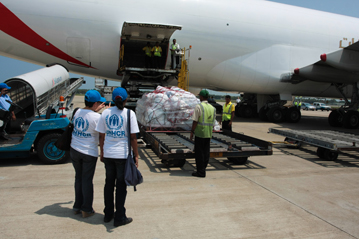Efforts to decongest Monrovia, reach other parts of Liberia, gain momentum
Efforts to decongest Monrovia, reach other parts of Liberia, gain momentum

MONROVIA, Liberia, Sept 12 (UNHCR) - Another 177 internally displaced people (IDPs) were transported out of Monrovia on Friday by the UN refugee agency, as efforts to relieve the pressure on the chronically overcrowded Liberian capital, as well as to launch exploratory missions and spread aid elsewhere in the country, start to gather momentum.
The relocation operation, which will be involving eight agencies in all, began on Thursday when UNHCR and ECOMIL trucks transported an initial group of 110 people to the Wilson and Jahtondo IDP camps in Montserrado, on the outskirts of Monrovia.
The operation aims to relocate a total of some 30,000 displaced people currently packed into 56 schools and a clinic, where they fled during the recent fierce fighting in and around Monrovia. It is likely to continue for several weeks. Meanwhile some 60,000 people are believed to have returned spontaneously to their home towns and villages, as a more secure environment gradually radiates outwards from Monrovia as a result of the deployment of the ECOMIL peace-keeping troops.
"The decongestion of Monrovia is very important and needs to be accelerated in order to allow people to pick up their lives, and enable the humanitarian agencies to see to the needs of the displaced," said Moses Okello, UNHCR's representative in Liberia.
Over the past few weeks, UNHCR has been working closely with the camp managers of the eight IDP camps in the Montserrado area, in order to improve services and ensure that everything was in place to receive the IDPs, many of whom were living in dire conditions in Monrovia for many weeks.
UNHCR has also been working closely with ECOMIL to ensure that improved security - a vital prerequisite for any operation inside this anarchic and war-wracked country - was established in and around the Montserrado camps.
As the operation got underway, UNHCR and the Office for the Coordination of Humanitarian Affairs (OCHA), took part in a one-hour "talk back" radio show to inform people about the relocation exercise, clarify the reasons for it, and give them an opportunity to call in and ask questions. Several people called in to enquire about the security situation and living conditions in the Montserrado camps.

Meanwhile, another inter-agency team left Monrovia by sea on a boat chartered by the World Food Programme, heading for the south-eastern town of Harper, where they are expected to arrive on Saturday afternoon. Following an initial reconnaissance mission by UNHCR's security officers, the team will spend a day assessing the situation in the Harper area, from where disturbing reports have been coming in recent days.
UNHCR is particularly concerned about the fate of thousands of Ivorian refugees and Liberian returnees who had been living in camps in Harper, Fish Town and Pleebo. UNHCR had three offices in eastern Liberia and was taking care of a total of 38,000 Ivorian refugees, 45,000 Liberain returnees and 15,000 people from other countries who had been trapped inside Liberia when the latest round of fighting broke out.
"We evacuated our staff from Harper on March 12, when the security situation got really bad," said Jo Hegenhauer, UNHCR's emergency coordinator who was in charge of the southern and eastern part of Liberia from November 2002 until the April evacuation. "This will be the first time we've gone back. We know there are people in that region, and maybe also in our three camps, with urgent needs that we need to address sooner rather than later."
UNHCR's office in Tabou, just across the border in Côte d'Ivoire, recently received credible reports that Harper had been severely looted and that there had been considerable destruction and violence, including widespread sexual assaults.
Elsewhere, the amount of displacement was reported to have abated in the Totota, Salala and Kakata region to the north of Monrovia, as ECOMIL troops moved further into the area, dismantling or taking over militia checkpoints. Indeed, by Friday it was being reported that some people were starting to return to Totota, which only a week earlier was deserted by a large proportion of its panic-stricken inhabitants.









